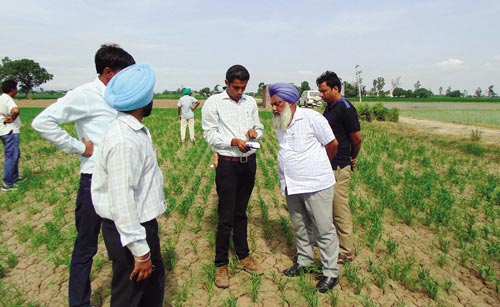By JM Sutaliya, Parvinder Singh, Tripti Agarwal, ML Jat/CIMMYT and Anil Bana/Department of Agriculture, Government of Punjab, India

CIMMYT, with financial support from the CCAFS South Asia regional program, recently initiated climate-smart village (CSV) pilots in Punjab State, India. On 16 June, Dr. IPS Sandhu, chief agriculture officer of Patiala District, and several other officers visited Aluna, one of the CSVs being piloted in close collaboration with the Punjab Department of Agriculture and several innovative farmers. The on-site stakeholder discussions on the emerging challenges of climate change included topics such as the El Niño effect during the current monsoon season and extended rains during the maturity period of winter crops.
The participants agreed that climate-smart agricultural practices being undertaken in the CSVs are some of the best for making farming resilient and sustainable in the Punjab. CIMMYT’s JM Sutaliya and Punjab’s Vimalpreet Singh gave briefings on the climate-smart agriculture practices being undertaken in the CSVs, including direct-seeded rice (DSR), precision water management using Punjab Agricultural University-designed tensiometers, precision nutrient management using the Nutrient ExpertTM tool, GreenSeeker, energy saving technologies, introduction of maize to diversify rice mono-cropping and efficient weed management in DSR. Farmers were given demonstrations of the GreenSeeker tool for nitrogen management and spraying techniques for weed control on DSR. The proposed Weather Smart weather forecasting services for farmers were also discussed.
Sandhu praised the CSV initiatives and shared his suggestions to strengthen and expand the CSV program in Punjab’s Patiala District. Additionally, he proposed a baseline socioeconomic survey of Aluna, formation of a farmers’ group, a women farmers’ club and other strategies to encourage more farmer contact. Looking to the future, he advocated integration with allied agriculture departments. Highlighting community-supported agriculture interventions for residue management, Sandhu spoke about the importance of advance planning and utilizing a spreader with a combine harvester. He also shared his personal experience using a Turbo Happy seeder to avoid burning straw in subsequent wheat crop.
Sandhu assured CIMMYT of close collaboration from the Department of Agriculture in the future, including extended support to scale up and expand the climate-smart agriculture initiatives in the CSVs with the goals of combating the adverse effects of climate change and addressing food security.
 Capacity development
Capacity development